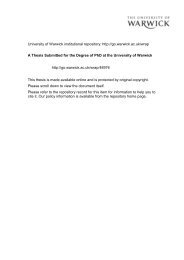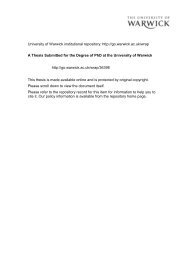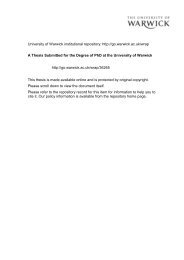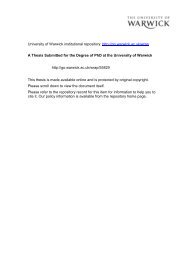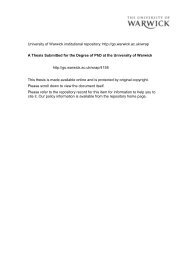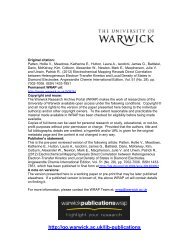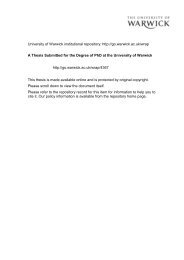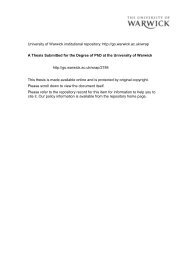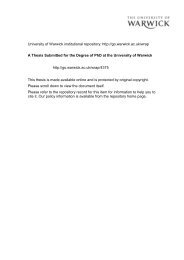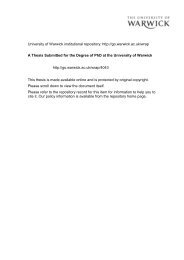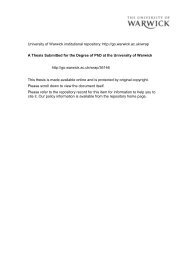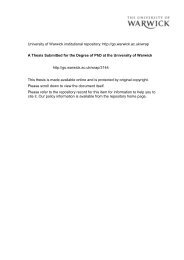- Page 1 and 2: University of Warwick institutional
- Page 3 and 4: Contents Acknowledgements 11 Declar
- Page 5 and 6: Abstract Unmanned Territories: Cont
- Page 7 and 8: INTRODUCTION 'La musica degli altri
- Page 9 and 10: with the text of the past, which in
- Page 11 and 12: juxtaposition and comparison. Their
- Page 13 and 14: divergence in period, style and phi
- Page 15 and 16: (Irigaray) non SI puo In ogni caso
- Page 17: texts concern the textual enclosure
- Page 20 and 21: grande Eulalia' finds her mental sp
- Page 22 and 23: write, neither author nor protagoni
- Page 26 and 27: Professor in Medieval German Philol
- Page 28: 'anything goes'. The generic space
- Page 31 and 32: function' of the text in relation t
- Page 33 and 34: soprannaturale.Y' It is no longer p
- Page 35 and 36: Thus the threshold position of the
- Page 37: through this Law. It will also be w
- Page 41: i.ii. The Microcosm of Literature '
- Page 44 and 45: epresentation and an emphasis on th
- Page 46 and 47: literary metaphor can mean the poss
- Page 48: practitioners and a marginalization
- Page 51 and 52: Indeed those twentieth century writ
- Page 53 and 54: theory about the postmodem success
- Page 55 and 56: Frankenstein belittles Mary's work
- Page 57 and 58: eader is a trace ofa latent vocatio
- Page 59 and 60: also be possible to see this quiet
- Page 61 and 62: Pygmalion theme in relation to Fran
- Page 63: end of her analysis with references
- Page 66 and 67: Such a theory proposes that women w
- Page 68 and 69: Seeing the potential for the fantas
- Page 70: understanding of the sexed and gend
- Page 73 and 74: ease with woman through its self-co
- Page 75 and 76:
CHAPTER TWO Mirror, mirror on the w
- Page 77 and 78:
opening up new dimensions or spaces
- Page 79 and 80:
'La grande Eulalia' 'Je fennerai pa
- Page 81 and 82:
crowds, also singing sweetly (as he
- Page 83:
'lacking' in relation to the man, a
- Page 86 and 87:
mystery for the female subject from
- Page 88 and 89:
eason, but very little has been mad
- Page 90 and 91:
eturns to his cavern underground wh
- Page 93 and 94:
the home ofthe new governor's famil
- Page 95 and 96:
with it may differ radically betwee
- Page 97 and 98:
observers, a woman pianist would gi
- Page 99 and 100:
empty-headed and trivial. Adele's r
- Page 101 and 102:
One might argue that whilst the enc
- Page 103 and 104:
ii. The female paradox of 'il falso
- Page 105 and 106:
her inner turmoil, up until the nig
- Page 107 and 108:
The marked autobiographical content
- Page 109 and 110:
epresentation of the self such as t
- Page 111 and 112:
possibilities of the novel are atte
- Page 113 and 114:
traditional pattern of the autobiog
- Page 115 and 116:
previous self behind through writin
- Page 117 and 118:
ole of imitator and translator unle
- Page 119 and 120:
very much upon the traditional noti
- Page 121 and 122:
emphasizing the oneiric in particul
- Page 123 and 124:
suspension of historical-geographic
- Page 125 and 126:
disturbing element appears in domes
- Page 127 and 128:
authored models make the hotel the
- Page 129 and 130:
The overlap between these two forms
- Page 131 and 132:
The narrator's writing provides the
- Page 133 and 134:
the unconscious and conscious illus
- Page 135 and 136:
The desire to return to oneself, to
- Page 137 and 138:
finds herself confronted by a wall:
- Page 139 and 140:
The endorsement ofa third invisible
- Page 141 and 142:
female life-giving powers. However
- Page 143 and 144:
femminile', which she has speculate
- Page 145 and 146:
fiercer will be her struggle with n
- Page 147 and 148:
they are allowed to fade - or are s
- Page 149 and 150:
volta.'(Menzogna, p.21). She too th
- Page 151 and 152:
Mi pare ormai [...] incredibile di
- Page 153 and 154:
eflection of the author. The narrat
- Page 155 and 156:
this non-existent space beyond gend
- Page 157 and 158:
Duranti's portraits ofmodem men see
- Page 159 and 160:
complexity, depth and female specif
- Page 161 and 162:
window of his flat until he has fin
- Page 163 and 164:
The fact that the novel opens on Fa
- Page 165 and 166:
something that does indeed create p
- Page 167 and 168:
than some kind of therapeutic worki
- Page 169 and 170:
two negatives. Like a double agent
- Page 171 and 172:
his childhood, is never going to ma
- Page 173 and 174:
this symbolic origin that he wishes
- Page 175 and 176:
abstract level "entry into enclosed
- Page 177 and 178:
etween Fabrizio and Mario. In each
- Page 179 and 180:
The fact that the text comes to lif
- Page 181 and 182:
disable her at every turn and becom
- Page 183 and 184:
In attempting to strike a balance b
- Page 185 and 186:
igata eterogenea - un uomo vivo, un
- Page 187 and 188:
controlled destiny. The theme of de
- Page 189 and 190:
addressed to her students, recounts
- Page 191 and 192:
caso un oggetto di cui non riuscivo
- Page 193 and 194:
as though the loosening of spatial
- Page 195 and 196:
possibilities, which could be ofuse
- Page 197 and 198:
II s' ensuit que pour retrouver la
- Page 199 and 200:
contrast Ombres' formation as a poe
- Page 201 and 202:
novels, particularly the roles of e
- Page 203 and 204:
'scarabangeli', whose mutations and
- Page 205 and 206:
the textual prison, in their very d
- Page 207 and 208:
protagonist's death and re-birth in
- Page 209 and 210:
countryside it barely holds at bay
- Page 211 and 212:
family tragedy hangs heavily in the
- Page 213 and 214:
several occasions to childhood scen
- Page 215 and 216:
self and private self. The name 'Sa
- Page 217 and 218:
The whole novel is therefore tantal
- Page 219 and 220:
Significantly she looks to fantasti
- Page 221 and 222:
apparent rational basis of the one
- Page 223 and 224:
petrifaction or dissolution of the
- Page 225 and 226:
time, not in the union oflovers, bu
- Page 227 and 228:
Satriano, the relation to food ofte
- Page 229 and 230:
Chodorow claims that 'The basic fem
- Page 231 and 232:
delle pietre larghe e pesanti.'(La
- Page 233 and 234:
for a long time he evades the move
- Page 235:
The terror of enclosure is diminish
- Page 238 and 239:
novel, which in turn emphasize the
- Page 240 and 241:
form of a dialogue with the traditi
- Page 242 and 243:
eventually take control of the rela
- Page 244 and 245:
question associated as it is with c
- Page 246:
sexual liaisons with local girls, f
- Page 249 and 250:
initiator of events, subtly subvert
- Page 251 and 252:
lesson in poetry which his Imam had
- Page 253 and 254:
Conclusion Ma davvero per uscire di
- Page 255 and 256:
the male is forced to recognize the
- Page 257 and 258:
Bibliography Primary Texts Capriolo
- Page 259 and 260:
Brooke-Rose, Christine, A Rhetoric
- Page 261 and 262:
De Stefano, Antonino, 'Le leggende
- Page 263 and 264:
Isotta, Paolo, Il ventriloquo di Di
- Page 265 and 266:
Parati, Graziella, Public History:
- Page 267:
Wood, Sharon, Italian Women's Writi




